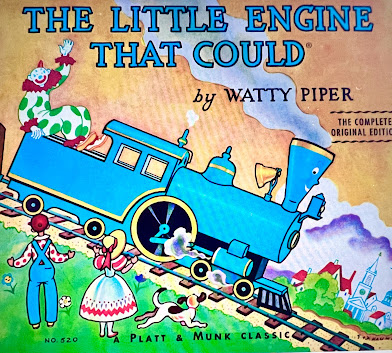~ ~ ~ The Little Engine That Could ~ ~ ~
Have you ever read The Little Engine That Could? It is an American children’s fairy tale that can be read in about five minutes. It was first published in 1930 and still found in bookstores and libraries. In this story, the little blue engine agrees to pull a larger train over a mountain, which seems like an impossible task. The engine succeeds in pulling the train over the mountain while repeating its motto: ‘I-think-I-can’. As it neared the top of the mountain, which had discouraged so many larger train engines, it went more slowly. However, it still kept saying, ‘I—think—I—can, I—think—I—can, I – think – I -can.’ It reached the top by drawing on the ability to be brave and then went back down the mountain, congratulating itself by saying, ‘I thought I could, I thought I could’, I thought I could.’
The lesson I took from this book, as a child and into my young adult life, was that I could do anything I was determined to do. The story is used to teach children the value of optimism, helping others when there is a need, and achievement by hard work. As you can image this “I think I Can” and “I thought I could” belief worked in my life on some occasions but often fell short. The narrative I was missing was walking with God’s word by trusting first in His plan. When younger, I would pray in the midst of difficulties or times of feeling praise for the good times in life. But I was not praying for God's plan to guide me.
I now see the concern, which developed in my life when I felt the need to be self- sufficient and in control of my destiny, without first understanding the power of going to God, with prayer, and understanding the support present through His loving grace. As a child and throughout my young adult years, I honored my Catholic tradition of weekly Mass. I loved then and now the beauty of the liturgical reflections in my worship service. However, I grew to depend mostly on the “I” in the equation of life and not the commandment to listen, learn and wait for the direction from God. The “I know I can” motto took me away from the loving heavenly support which I could have experienced from my heavenly Father.
The three interrelated points I hope to connect in my message involve:
1. Quieting the “I” to better hear God in our lives
2. Being humble
3. Listening, Observing and Following Jesus – The Way, the Truth, and the Life
The first message - WE MUST QUIET the “I think I can” to better hear God in our life.
When referring to ourselves, we often refer to the “I” with a reference defining the ego. Being a psychologist created a lot of study about the “I” or ego. Having a difficult personality or “ego” is often used to mean excessive personal pride and self – absorption. Too often our ego (the “I” in the equation) experiences the outside world and reacts to it in a self – reliant and self-important way.
The ego is our sense of self; it represents the “I aspect of the person. God gives us the gift of being uniquely talented and deeply loved as this preciously made person. The issue occurs when humans become too self-focused and self-reliant. So much of the world news talks about the lack of compassion and loss of community because of the shift of people becoming self-focused. As a psychologist I believe one of the reasons that the world is getting crazier is because people are not following the greatest commandment – to love God with all your heart and with all your mind and with all your strength.
In Mark 12:28-34 (The New International Version) we are told:
28 One of the teachers of the law came and heard them debating. Noticing that Jesus had given them a good answer, he asked him, “Of all the commandments, which is the most important?”
29 “The most important one,” answered Jesus, “is this: ‘Hear, O Israel: The Lord our God, the Lord is one.
30 Love the Lord your God with all your heart and with all your soul and with all your mind and with all your strength.31 The second is this: ‘Love your neighbor as yourself.’[c] There is no commandment greater than these.” 32 “Well said, teacher,” the man replied. “You are right in saying that God is one and there is no other but him. 33 To love him with all your heart, with all your understanding and with all your strength, and to love your neighbor as yourself is more important than all burnt offerings and sacrifices.”
34 When Jesus saw that he had answered wisely, he said to him, “You are not far from the kingdom of God.” And from then on no one dared ask him any more questions.
The Bible does not define 'ego' in the same way as a dictionary or a psychologist. The Bible does call us to die to ourselves (quieting the “I think I can”) in order to live in Christ.
The second message builds on the first:
Quieting the “I think I can” helps us be humble.
Being humble
According to the English dictionary humble means displaying the quality of having a modest or low view of one’s importance. From a psychological perspective, humble people have an accurate view of themselves, and can acknowledge their mistakes and limitations. Additionally, humble people keep their abilities and accomplishments in perspective by having a low self-focus and appreciating other people. In world affairs being humble increases our overall psychological wellbeing and ensures our social functioning. Humility is a matter of good self – esteem. An expression of humility shines through in our behavior toward others. Being humble is characterized by genuine gratitude and a lack of arrogance.
Knowing the definition and psychological benefits of being humble is educational. However, the biblical definition of being humble goes beyond this. What does the Bible teach us about the importance of being humble? Why is it important to be a humble follower of Christ? Bible commentaries have stated that “being truly humble is to see ourselves as we actually are, fallen in sin and helpless without God”.
The word “humble” appears all throughout the Bible. From childhood we are taught that God values a humble heart and calls us all to a life of being humble. Have you noticed being guided to a place of being humble?
For me it has been important to quiet my own voice and desire for a self-focused control. There was a time in my life that I felt more education – obtaining knowledge would provide a sense of peaceful knowing. I learned that education was only good when grounded in scripture with a desire to focus on the nature of God. I needed to more fully understand God’s words.
Proverbs 3:5 taught me to “Trust in the Lord with all your heart and lean not on your own understanding”.
Bible commentaries say that the Bible verse of Proverbs 3:5 (“Trust in the Lord with all your heart and lean not on your own understanding”) is an excellent summary of the Biblical meaning of being humble. We are called to listen and trust the wisdom and salvation from God. We must have faith that God will lead us in the best way to live and how to avoid temptations. Any belief in a personal power is an arrogance which hinders our ability to hear God’s words. His guidance and direction for our life. Being humble opens our hearts and minds and quiets any arrogance created by our uncontrolled ego.
One daily devotional I read, and find helpful, is written by Pope Francis. In a recent daily devotion written by Pope Francis the focus was on listening to God’s words to help us in the journey we do together. In this daily devotional, Pope Frances focused on Psalm 96 and wrote about proclaiming God’s marvelous deeds to all the nations.
Psalm 96 proclaims: “Sing to the Lord a new song; sing to the Lord, all the earth. Sing to the Lord, praise his name, proclaim his salvation day after day. Declare his glory among the nations, his marvelous deeds among all peoples”.
This urges to follow the 2000-year-old steps of Jesus as we work as His disciples to share His promise of peace. Pope Frances reinforces that we must be humble and acknowledge are ignorance and pride. We must not think we can do everything by ourselves and with our own strength. It is necessary to keep our ears open to the Word of God. Only by keeping are ears open can we learn God’s desires, His love, His way of thinking, His way of guiding, and His way of acting. The message from Pope Francis helps me think about being humble - how do I quiet my “I think I can” to fully listen to our Heavenly Father. What does it mean to be humble?
Psalm 25:9 teaches us how God leads the humble in God’s way. In Psalms, King David repetitively writes about his struggles and the need to be humble. In Psalm 25:9, King David gives praise to God for helping with the need to be humble. Psalm 25:9 says: “He leads the humble in what is right, and teaches the humble His way”. To know God we must be humble.
This leads to the third message which tells us that by quieting the "I think I can", being humble, and knowing Jesus we are able to follow – The Way, the Truth, and the Life
We are able to listen, observe and follow Jesus when we are humble. It is only in being humble in our prayers and actions due we hear, know and follow Jesus. Jesus himself showed us how to be humble. In living and dying for our sins, Jesus showed us how to have an absolute understanding that God alone guides us. In his humanness Jesus prayed, “My Father, if it is possible, let this cup pass me by”, however, in Jesus’ humble wisdom he added, “Nevertheless, let it be as you, not I, would have it”. We have salvation because of the humble obedience of one man – Jesus.
Even though I will continue to fondly remember The Little Engine That Could book, the narrative takes on a new meaning for me. Without God in the center of my plans by praying and listening for His guidance, I will not be able to feel the beautiful peacefulness only provided by following Jesus – the way, the truth, and the life. The three interrelated messages I shared – quieting the “I think I can”; being humble; and hearing Truth, make it possible to follow Jesus. We are capable of listening, observing, and knowing Jesus as the way, truth, and life only when living with God by keeping a humble heart. I now think of The Little Engine That Could book in a revised way. Here is my revision of The Little Engine That Could ...
The Little Engine That Could
There was a little railroad train with loads and loads of toys,
believing he could bring some fun to all the girls and boys.
But that little railroad train forgot to pray along the track,
and kept the focus on being strong without a humble hark.
The little train was going fast and feeling very proud.
Until it reached a mountain that was skyward bound.
The little engine moaned and groaned and huffed and puffed away,
but halfway to the top it just gave up and began to say:
I can’t go on, I can’t go on, I’m weary as can be.
I can’t go on, I can’t go on, this job is not for me.
The toys got out to push, but were not able to do the task.
And then a great big engine came a-whistling down the track.
They asked if it would kindly pull them up the mountainside,
but with a high and mighty sneer, it scornfully replied:
Don’t bother me, don’t bother me to pull the likes of you,
Don’t bother me, don’t bother me, I’ve better things to do.
The toys all started crying cause that engine was so mean.
And then there was another train, the smallest engine ever seen.
And though it seemed that this small train could hardly move at all,
the engine joined the bigger train and began being prayer full:
God, Lord Jesus, please help me now…
“I know You can”, “I know You can”, “I know You can”
Then up that great big mountain with the cars all full of toys,
and soon they reached the waiting arms of all the girls and boys.
And though that ends the story, it will do you lots of good
to take a lesson from the little engine that knew God could.
Remember to keep a humble heart and follow Jesus each day.
Every mountain will be easier when God leads the way.





Comments
Post a Comment